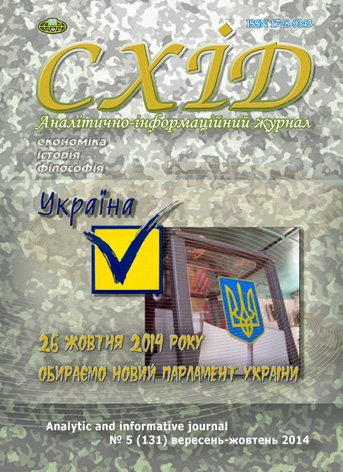Information constituent of a fiscal aspect of tax administration: Ukraine and international experience
DOI:
https://doi.org/10.21847/1728-9343.2014.5(131).29873Keywords:
information technologies, tax administration, electronic tax reporting, tax payersAbstract
The paper reviews some publications of domestic researchers, covering the application of information technologies in tax administration. It is concluded that most directions of tax administration in Ukraine, which were stipulated in the national Tax Code and are used in foreign countries with well-established taxation systems, were in a number of ways implemented over 2010-2013. The above specifically concerns public awareness efforts and services delivered to payers, exchange of tax information etc. It is however mentioned that information about a tax payer in our country is actualized in the tax information system only when he or she has begun to carry on business as an economic entity and submit tax accounts. In this context the experience of Germany is analyzed, where information about an economic entity is analytically processed yet on the stage of its registration as a tax payer. Some other aspects of the use of information technologies in administration of tax payments abroad are also covered and it is pointed out that learning the experience reviewed and assessment of the potentiality of its adaptation in the national taxation system would allow to save the budget of Ukraine from losses of revenues due to unfair conduct of potential tax payers and promote more efficient tax administration.
Downloads
References
Tax Code of Ukraine dated 02.12.2010. № 2755-VI, available at: http://www.nibu.factor.ua/ukr/info/NKU_rozd/ (ukr).
Laba M. (2010), Skhid, № 4 (104), July-August, pp. 61-64 (ukr).
Laba M. S. (2010), Modern technologies of tax information as a way to improve the tax system, The development methodologies and techniques of independent audit and state financial control: Proceedings of the Conference, Irpin, 188 p. (ukr).
Laba M. (2011), Visnyk podatkovoi sluzhby Ukrainy [Bulletin of the Tax Service of Ukraine], № 2 (622), pp. 6-7 (ukr).
Sanzharevska I., Laba M. (2013), Visnyk podatkovoi sluzhby Ukrainy [Bulletin of the Tax Service of Ukraine], № 1 (717), pp. 52-55 (ukr).
Yaroshenko F. O., Melnyk P. V., Miarkovskyi A. I. (2011), Reforming the tax system of Ukraine: Theory, Methodology, Practice, Ministry of Finance of Ukraine, Kyiv, 656 p. (ukr).
Lysenko Yu., Zakharchenko V. (2011), Informational and analytical support tasks of tax administration, State and Problems of taxation in a rapidly changing Economics: Proceedings of the Conference, Donetsk, 532 p. (rus).
Redych O. V. (2008), Principles for improving tax administration based on risk management, Tendencies and prospects of development of Ukraine's tax system: Proceedings of the Conference, Irpin, 626 p. (ukr).
Rippa S. P. (2010), Internet innovation in the IT tax, Modernization of the State Tax Service of Ukraine in the context of innovation development: Proceedings of the Conference, Irpin, 224 p. (ukr).
Naidenko O. Ye. (2010), Experience in tax administration in foreign countries, State and Problems of taxation in the global financial crisis: Proceedings of the Conference, Donetsk, 494 p. (ukr).
Sanzharevska I. S., Shapoval S. M., editor (2013), Economic analysis: basic course for tax analyst, Kyiv, 800 p. (ukr).
Suprun S., Herasymenko N. (2013), Visnyk Ministerstva dokhodiv i zboriv Ukrainy, № 40 (754), pp. 48-51 (ukr).
Sazonov R. (2013), Visnyk podatkovoi sluzhby Ukrainy [Bulletin of the Tax Service of Ukraine], № 32 (746), pp. 46-48 (ukr).
Sazonov R. (2013), Visnyk podatkovoi sluzhby Ukrainy [Bulletin of the Tax Service of Ukraine], № 21 (737), pp. 54-56 (ukr).
From e-Government to Connected Governance, United Nations e-Government Survey 2008, available at: http://unpan1.un.org/intradoc/groups/public/documents/un /unpan028607.pdf (engl).
Downloads
Published
How to Cite
Issue
Section
License
Copyright (c) 2014 Myroslav Laba

This work is licensed under a Creative Commons Attribution-NonCommercial-NoDerivatives 4.0 International License.
1. Authors bear responsibility for the accuracy of facts, quotations, numbers and names used.
2. Manuscripts are not sent back.
3. The publisher does not always agree with the authors' opinion.
4. The authors reserve the right to authorship of the work and pass the first publication right of this work to the journal under the terms of a Creative Commons Attribution-NonCommercial-NoDerivatives 4.0 International License. This license allows others to distribute (copy) the published work for non-commercial purposes, provided there is mandatory attribution to its authors and a link to the first publication in our journal.
5. The authors have the right to conclude separate supplement agreements that relate to non-exclusive work distribution in the form in which it has been published by the journal (for example, to upload the work to the online storage of the journal or publish it as part of a monograph), provided that the reference to the first publication of the work in this journal is included.

